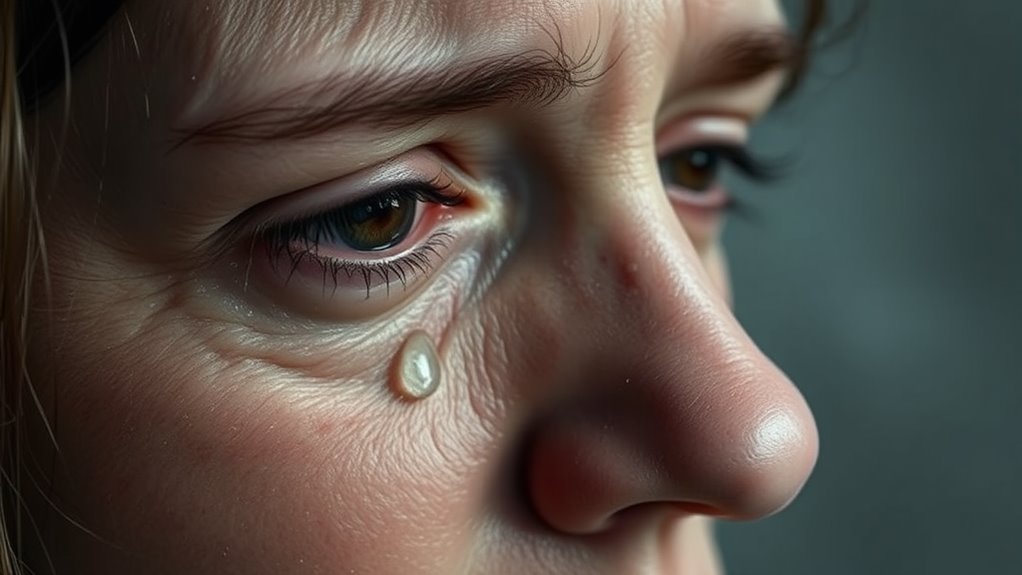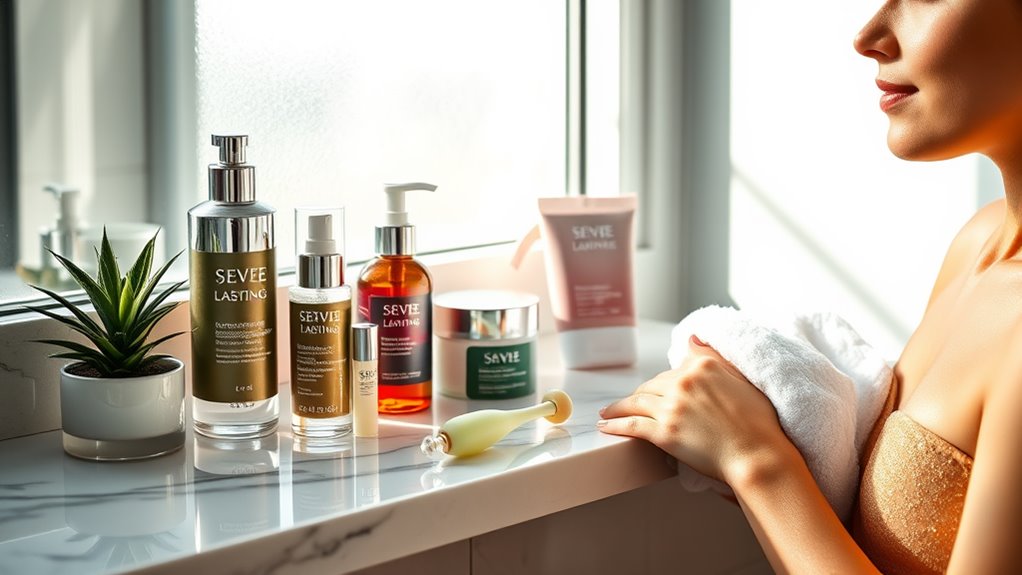You’re Not Sleeping Enough – And Your Skin Is Paying the Price
Lack of sleep directly impacts your skin health, causing dullness, pronounced fine lines, and increased breakouts. During sleep, your body produces collagen and growth hormones that repair and rejuvenate skin cells. Insufficient rest disrupts this process, leading to a lifeless complexion and premature aging. Elevated stress hormones from poor sleep exacerbate skin inflammation. Prioritizing restorative sleep is essential for maintaining youthful skin and overall wellness. Discover essential strategies to enhance your sleep quality and skin health further.
Key Takeaways
- Insufficient sleep disrupts collagen production, leading to increased fine lines and wrinkles on the skin.
- Lack of rest can cause a dull complexion and uneven skin texture due to impaired cell turnover.
- Elevated cortisol levels from sleep deprivation trigger oil production, resulting in more breakouts and inflammation.
- Dark circles and puffiness appear as hormonal imbalances disrupt the skin’s repair processes during sleep.
- Prioritizing quality sleep is essential for maintaining skin health and enhancing overall appearance.
The Science of Sleep and Skin Health
When you sleep, your body undergoes crucial processes that significantly impact your skin health.
During deep sleep, your body enters a state of repair and regeneration, facilitating the production of collagen and elastin—essential proteins for maintaining skin elasticity and firmness.
Sleep enhances blood flow, delivering vital nutrients and oxygen to skin cells, promoting a radiant complexion.
Additionally, your body releases growth hormones that aid in cellular repair, reducing inflammation and accelerating healing.
Adequate sleep also balances hormones, including cortisol, which, when elevated, can contribute to skin issues.
Prioritizing quality sleep fosters an optimal environment for skin health, allowing your skin to recover from daily stressors, thus enhancing its overall appearance and resilience. Furthermore, studies show that adequate sleep directly influences the skin’s ability to combat environmental damage, making it crucial for maintaining a youthful glow.
How Sleep Deprivation Affects Your Skin
When you don’t get enough sleep, your skin may start to show the effects, leading to a dull complexion and uneven texture.
Lack of rest can also accelerate the appearance of aging, as fine lines and wrinkles become more pronounced. Additionally, sleep deprivation can result in increased breakouts, as stress hormones trigger oil production in the skin.
Understanding these consequences can motivate you to prioritize quality sleep for healthier skin.
Dull Complexion and Texture
Lack of sleep can take a toll on your skin, leading to a dull complexion and uneven texture. During sleep, your body undergoes vital regenerative processes, including skin cell turnover. Insufficient sleep impairs these functions, causing your skin to appear lifeless and rough. Here’s a quick overview of how sleep deprivation impacts skin quality:
| Effect | Consequence | Solution |
|---|---|---|
| Reduced cell turnover | Dull complexion | Prioritize sleep |
| Impaired hydration | Uneven texture | Hydrate adequately |
| Increased cortisol | Inflammation and redness | Manage stress effectively |
| Decreased blood flow | Lackluster appearance | Improve circulation |
Addressing sleep deficiency is crucial for achieving a vibrant complexion and smooth texture. Prioritize restorative sleep to maintain your skin’s health.
Increased Signs of Aging
Insufficient sleep accelerates the aging process of your skin, making fine lines and wrinkles more pronounced.
During sleep, your body undergoes crucial repair processes, including collagen production and cell regeneration. When you skimp on sleep, these processes are disrupted, leading to a decline in skin elasticity and moisture retention.
Elevated cortisol levels from sleep deprivation can also exacerbate inflammation, resulting in puffiness and dark circles.
Additionally, reduced blood flow during inadequate sleep limits the delivery of essential nutrients to your skin.
Over time, this cumulative effect can lead to a tired, aged appearance.
Prioritizing restorative sleep is essential for maintaining youthful, vibrant skin and mitigating the visible signs of aging that stem from chronic sleep deprivation.
Common Skin Issues Linked to Lack of Sleep
Lack of sleep can lead to several skin issues that may impact your overall appearance.
You might notice a dull complexion, increased acne breakouts, and even signs of premature aging. Understanding these connections can help you prioritize your sleep for healthier skin. Additionally, improving your nightly sleep routine can significantly enhance your skin’s radiance and overall health.
Dull Complexion Problems
A good night’s sleep is essential for maintaining vibrant skin, yet many people experience a dull complexion due to insufficient rest.
Sleep deprivation disrupts the skin’s natural repair processes, leading to a lack of radiance. When you’re sleep-deprived, blood flow is reduced, causing a paler appearance and diminishing the skin’s glow.
Additionally, decreased moisture retention occurs, resulting in dryness and flakiness, further contributing to a lackluster look. Your body also produces less collagen during sleep, crucial for skin elasticity and firmness.
Over time, this can accentuate fine lines and uneven texture. Prioritizing quality sleep not only enhances your overall well-being but also revitalizes your complexion, allowing your skin to reflect health and vitality.
Increased Acne Breakouts
As you skimp on sleep, your skin’s ability to combat acne diminishes significantly. Sleep deprivation leads to increased cortisol levels, which can trigger excess oil production and inflammation, creating an ideal environment for acne to flourish.
| Factor | Effect on Acne | Solution |
|---|---|---|
| Sleep Deprivation | Increases cortisol | Prioritize sleep |
| Stress | Aggravates inflammation | Practice relaxation |
| Poor Diet | Disrupts skin balance | Adopt a balanced diet |
| Hormonal Imbalance | Triggers breakouts | Consult a specialist |
| Inadequate Hydration | Impairs skin repair | Stay hydrated |
To maintain clear skin, ensure you’re getting adequate sleep and managing stress effectively. Your skin will thank you for it.
Premature Aging Signs
When you don’t prioritize sleep, your skin can show signs of premature aging much sooner than you might expect. Insufficient rest accelerates collagen breakdown, leading to fine lines and wrinkles.
The skin’s ability to repair itself diminishes, resulting in a dull complexion and uneven texture. Sleep deprivation also disrupts hormonal balance, increasing cortisol levels, which can cause inflammation and exacerbate skin conditions.
Furthermore, chronic lack of sleep can result in dark circles and puffiness around the eyes, contributing to an aged appearance.
To combat these effects, aim for consistent, restorative sleep. By doing so, you’ll not only enhance your overall health but also support your skin’s natural rejuvenation processes, keeping premature aging at bay.
The Role of Sleep in Skin Repair and Regeneration
While you sleep, your skin undergoes essential repair and regeneration processes that play a crucial role in maintaining its health and appearance.
During deep sleep, your body increases blood flow to the skin, promoting the delivery of oxygen and nutrients. This process stimulates collagen production, which helps maintain skin elasticity and reduces the appearance of fine lines.
Additionally, growth hormones are released, facilitating cell turnover and repair of damaged skin. The skin’s barrier function improves as well, enhancing moisture retention and protection against environmental stressors. Poor sleep quality can significantly disrupt these vital processes, leading to adverse effects on your skin.
Without sufficient sleep, these regenerative processes are disrupted, leading to dullness, uneven texture, and accelerated aging.
Prioritizing quality sleep is vital for achieving vibrant, youthful skin.
The Connection Between Stress and Sleep
Stress significantly impacts the quality of your sleep, creating a cycle that can be difficult to break. When you experience stress, your body releases cortisol and adrenaline, hormones that can keep you alert and awake. This heightened state of arousal hinders your ability to fall asleep and attain restorative sleep stages.
Consequently, insufficient sleep exacerbates stress levels, leading to a vicious cycle. Chronic stress not only disrupts your sleep architecture but also affects your mental and physical health, increasing the likelihood of anxiety and mood disorders. Moreover, stress contributes to skin problems, making it crucial to address both sleep and stress for optimal skin health.
To improve your sleep quality, it’s essential to manage stress through techniques such as mindfulness, exercise, or cognitive-behavioral strategies. Addressing these interconnected issues can enhance your overall well-being and skin health.
How Aging Is Accelerated by Poor Sleep
Poor sleep not only leaves you feeling fatigued but also accelerates the aging process in your skin.
When you’re sleep-deprived, your body’s ability to regenerate skin cells diminishes, leading to a dull complexion and increased signs of aging.
Understanding this connection can motivate you to prioritize restorative sleep for healthier, more youthful skin.
Sleep Deprivation Effects
Sleep deprivation significantly impacts your skin health, accelerating the aging process. When you don’t get enough rest, your body produces higher levels of cortisol, a stress hormone that can lead to skin inflammation and breakouts.
Lack of sleep also impairs your skin’s ability to repair itself, diminishing collagen production and promoting wrinkles. You may notice dark circles and a dull complexion due to reduced blood flow and oxygenation.
Additionally, your skin’s barrier function weakens, making it more susceptible to environmental damage. This creates a vicious cycle where poor sleep exacerbates skin aging, leading to further sleep disturbances.
Prioritizing adequate sleep is essential for maintaining youthful, vibrant skin and mitigating these detrimental effects.
Skin Regeneration Disruption
When you consistently miss out on restorative sleep, your skin’s natural regeneration process falters, leading to accelerated signs of aging.
Sleep deprivation disrupts various biological processes crucial for maintaining youthful skin. Here’s how:
-
Collagen Production: Reduced sleep decreases collagen synthesis, leading to a loss of skin elasticity.
-
Hormonal Imbalance: Poor sleep affects hormone levels, increasing cortisol and promoting skin breakdown.
-
Inflammation: Inadequate rest elevates inflammatory markers, causing skin issues like redness and puffiness.
-
Cell Turnover: Sleep deprivation slows down cell turnover, resulting in a dull complexion.
Tips for Improving Sleep Quality
Though many factors influence your overall well-being, prioritizing quality rest can significantly enhance both your health and skin appearance.
To improve sleep quality, establish a consistent sleep schedule by going to bed and waking up at the same time daily. Create a calming bedtime ritual, such as reading or practicing mindfulness, to signal your body that it’s time to wind down.
Limit exposure to screens at least an hour before sleep, as blue light can disrupt melatonin production. Ensure your bedroom environment is conducive to rest—keep it cool, dark, and quiet.
Lastly, avoid heavy meals and caffeine close to bedtime to prevent disruptions. By implementing these strategies, you can foster better sleep, benefiting your overall health and skin vitality.
Nighttime Skincare Routine for Better Results
Since your skin repairs itself during the night, establishing an effective nighttime skincare routine is crucial for achieving optimal results.
Implementing the right regimen can enhance your skin’s recovery process and improve overall appearance. Here’s a succinct four-step guide to follow:
-
Cleanse: Remove impurities and makeup to prevent clogging pores and allow for better product absorption.
-
Exfoliate: Use a gentle exfoliant to remove dead skin cells, promoting cell turnover and skin renewal.
-
Treat: Apply targeted treatments, such as serums with retinol or antioxidants to address specific concerns like aging or hyperpigmentation.
-
Moisturize: Seal in hydration with a nourishing moisturizer to support the skin’s barrier and enhance moisture retention overnight.
The Impact of Diet on Sleep and Skin
Your nighttime skincare routine lays the foundation for healthy skin, but what you consume before bed also plays a significant role in both your sleep quality and skin health.
Foods rich in antioxidants, vitamins, and healthy fats can enhance skin repair processes during sleep. Conversely, high sugar or processed foods can trigger inflammation, leading to skin issues like acne.
Additionally, caffeine and alcohol may disrupt your sleep cycle, affecting your body’s ability to rejuvenate. Incorporating magnesium-rich foods, such as nuts and leafy greens, can promote relaxation and improve sleep quality.
The Benefits of Napping for Skin Health
Napping can significantly enhance your skin health by providing a much-needed boost to the body’s restorative processes. Short periods of sleep can rejuvenate your complexion in several ways:
-
Cell Regeneration: Naps facilitate the regeneration of skin cells, promoting a fresher appearance.
-
Reduced Stress Hormones: They lower cortisol levels, which helps prevent skin issues linked to stress.
-
Enhanced Blood Flow: Increased circulation during sleep enhances nutrient delivery to skin tissues, improving overall tone.
-
Hydration Maintenance: Napping helps maintain moisture balance, reducing dryness and promoting a supple feel.
Incorporating naps into your routine not only revitalizes your energy but also directly contributes to healthier, more vibrant skin.
Prioritizing this practice can yield significant benefits for your overall complexion.
Creating a Sleep-Friendly Environment
To achieve optimal skin health through sleep, creating a sleep-friendly environment is essential.
Start by ensuring your bedroom is cool, ideally between 60 to 67 degrees Fahrenheit, as cooler temperatures promote deeper sleep. Block out light with blackout curtains, and minimize noise with earplugs or white noise machines; both can significantly enhance sleep quality.
Invest in a comfortable mattress and pillows that support your preferred sleeping position. Additionally, consider the quality of your bedding; natural, breathable fabrics like cotton or linen can regulate temperature and moisture.
Establish a consistent sleep schedule, signaling your body when it’s time to wind down. By implementing these changes, you’ll cultivate an environment conducive to restorative sleep, ultimately benefiting your skin health.
When to Seek Professional Help for Sleep Issues
How can you tell when sleep issues require professional intervention? Recognizing the right moment to seek help can significantly enhance your sleep quality and, consequently, your skin health.
Consider consulting a professional if you experience:
- Persistent insomnia lasting more than three weeks.
- Excessive daytime sleepiness affecting your daily activities.
- Frequent nightmares or night terrors disrupting your sleep cycle.
- Underlying medical conditions like anxiety, depression, or sleep apnea.
Taking these factors into account can guide you toward appropriate treatment options.




